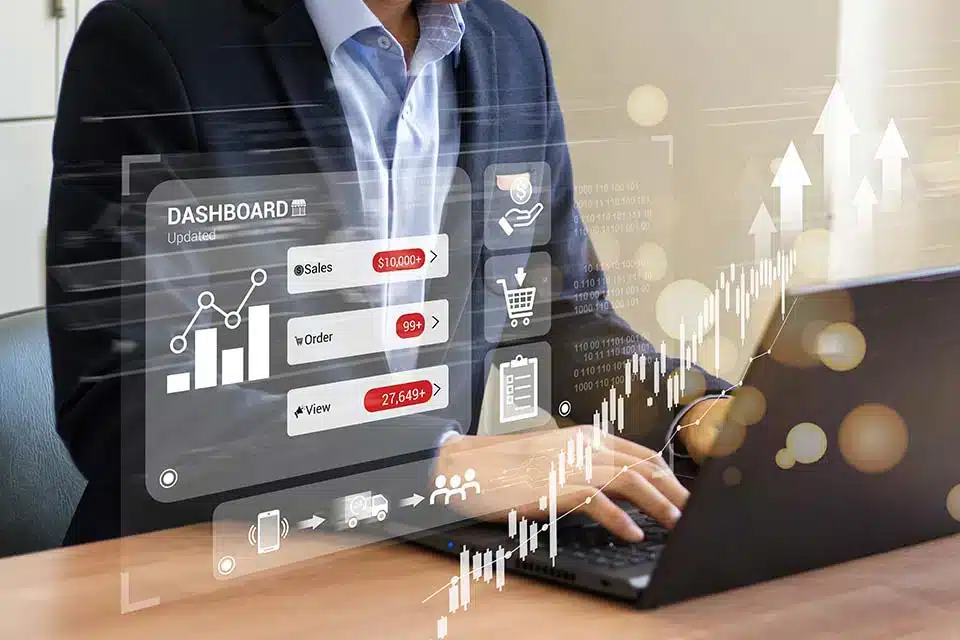The point of sale is more than just a register for small and large businesses alike. With each new transaction comes new, powerful data that can promote better choices, improved customer service and increased revenue. Yet many retailers are left asking, What is point of sale data and why is it important? POS analytics can be one of the most powerful tools at a retailer’s fingertips. From inventory insights to employee efficiency to customer purchasing habits, point of sale data can transform how a merchant operates. But to unlock all that potential, retailers need to integrate their POS credit card processing systems to make those bits of information into actionable changes that can help merchants stay afloat and flourish.
What Is Point of Sale Data?
Point of sale data is the information collected every time a customer buys a product or service. It contains what product and payment method was purchased, whether it was credit or debit card processing, how much was spent, when and where the purchase happened, among many other factors[1]. Different aspects of credit card processing, POS systems load this information through credit card processing terminals and receipt creation. Therefore, with every transaction at a point of sale, data is collected and stored for future reference. What was once used merely for receipt creation can become super powerful when used to understand needs, wants, behaviors and potential.
How POS Credit Card Processing Promotes Reliable Data
The process of credit card processing at the POS has a direct correlation with the reliability of credit card data within a merchant’s framework. For example, many credit card processing systems work in tandem with the merchant’s POS system, meaning that instead of credit card authorization and settlement being separate from the sales transaction, everything is compiled under one reliable system. The credit card processing through one fail-safe system means merchants can sell goods by credit card and have their inventory updated in real time and reliably. This avoids human miscalculations, errors and under- or over-stocking situations. In addition, because credit card transactions must be PCI compliant, any transactions run through a secure POS system means that the data captured with respect to customer credit cards is equally secure, making merchants have a reliable view of what they have in their inventory system, and what is actually there[2]. Reliable data is the first step for analytics.
How to Use POS Data for Business Intelligence
Merchants are busy compiling their own data outside of previous transactions is an impossible task and all but overwhelming. However, being able to analyze prior transaction data gleaned from a POS leads to useful information relevant to annual trends within any merchant’s specific business. For example, restaurants can leverage their POS systems to see what appetizers sell best consistently and when they can determine if there are any seasonal spikes or consistent failures. For example, if a specific restaurant only sells specific appetizers on Friday nights between 5 and 7 pm, they’ll want to adjust their happy hour drink menu to accommodate this newfound knowledge and staff accordingly. For physical goods retailers, the same can be said about specific sales spikes within product bundles. Merchants may use analytics from their POSs to determine if specific creams sell more when bundled with other beauty products. Marketing money can be focused on that domain. When merchants have analytics at their disposal through a POS system, guesswork can be avoided for much clearer facts based on previous transactions.
How Inventory Management Is Enhanced Thanks to POS Analytics
One of the best practical applications of having reliable data through credit card processing obtained from a POS is for inventory management. Overstuffing inventory can be just as damaging as under-stocking, as both scenarios can lead to lost revenue opportunities[3]. Through POS analytics, merchants have incredible insight into what’s selling quickly and what may never sell again. This can help merchants with capital expenditures for future orders just as much as it helps them learn and aggregate demand forecasting. This saves time and money and minimizes waste, and for industries with strict inventory management needs, from textiles to food service to healthcare, where high standards of customer service operations cannot falter due to faulty or inaccurate inventory, accurately placed inventory orders can be the difference between a competitive advantage.
Better Customer Service via POS Analytics
POS data is critical for operations behind the scenes. Still, it’s also necessary when forming a feel-good customer experience. For example, knowing purchase history information allows companies to promote deals specifically aimed at what customers buy. A cafe can send a gift card to the most purchased drink; a spa can offer additional services related to what they’ve booked for mani/pedis before. The more a company knows about its customers—and researches— the better its relationship with the business and its customers, and the better chance customers come back. The same goes for understanding peak times for transactions. By knowing when the business is busiest, it can staff up to accommodate crowds, thus reducing wait times and improving service. POS analytics enhances the customer experience and encourages return visits.
Fraud Protection and Compliance Perks
Especially for higher-risk industries, dedicated POS credit card processing systems that work with data trend analysis help promote compliance and fraud protection. Reviewing credit card transaction activity within the system allows for repeated information—such as recurring denied transactions or varying dollar amounts—to be assessed quickly and reported as a flag. This reduces chargebacks and helps protect both parties involved[4]. For industries that exist under strict regulatory compliance, being able to provide a full trail of POS data helps ensure compliance audits go smoothly. Fraud detection exists within the same accounting system as sales data and consumer transactions, meaning vulnerabilities can be lessened without taking time away from processing a transaction.
The Value of POS Data to Marketing
Marketing efforts are doubly effective when they leverage actual POS data. Businesses no longer have to make broad assumptions; they can, instead, understand customer segments based on buying patterns. POS data reveals who the best customers are, their frequency of purchase and what they are most likely to buy. Thus, merchants can develop more specific campaigns, achieve fair loyalty rewards and even know whether something is a successful sale by tracking changes in sales directly related to buy-in. For instance, using POS analytics with digital marketing resources allows for a more nuanced and accountable campaign that can be adjusted seconds after launch if need be.
What's Next for POS Analytics?
The future of POS analytics happens in real-time with predictive sources of information. Artificial intelligence will facilitate demand predictions and proactive or reactive offer options based on problems faced forward or retrospectively. Eager businesses already looking for credit card processing POS services through a cloud-based system will allow them to garner information they need from anywhere and make decisions as they see fit in time-sensitive environments. As customers become increasingly demanding and relying on multi-use access for all things, the ability for POS systems to integrate with omnichannel resources will give merchants a larger picture of customer activity, no matter where the interaction takes place. Being one step ahead of the game keeps businesses competitive in a constantly changing market.
FAQs
Q: What is point of sale data and why is it important?
A: Point of sale data is the information collected at the time and place of sale between buyer and seller. It’s important because it reveals sales information trends, buyer patterns and opportunities worthy of operational change.
Q: How does POS credit card processing enable data analysis?
A: POS credit card processing systems encourage sales accuracy and secure payments. When a sale occurs, the transaction details are logged, creating accurate datasets that can be analyzed for business intelligence.
Q: Does POS analytics help reduce fraud and chargebacks?
A: It does. By analyzing transaction trends in real-time, the POS system can flag certain information for suspicious behavior, reducing occurrences of fraud and chargebacks while helping with compliance[5].
Q: How does POS data improve customer experience?
A: POS systems store customer history; therefore, businesses can offer tailored discounts and gifts while also monitoring inventory for what’s been selling most or figuring out peak times when more staff is needed to facilitate better service.
Q: How does POS data affect marketing?
A: POS data helps businesses segment customer markets and gauge the success of promotions. When businesses use solid sales data to create more targeted promotions, they can ensure success and results that can be tracked.
Sources
- Investopedia. “Point of Sale (POS).” Accessed August 2025.
- Shopify. “What Is a POS System? A Complete Guide for 2025” Accessed August 2025.
- Forbes Advisor. “Best POS Systems of 2025.” Accessed August 2025.
- Visa. “Consumer Payment Security.” Accessed August 2025.
- PCI Security Standards Council. “PCI DSS Quick Reference Guide.” Accessed August 2025.











